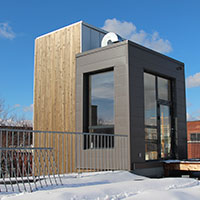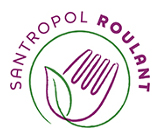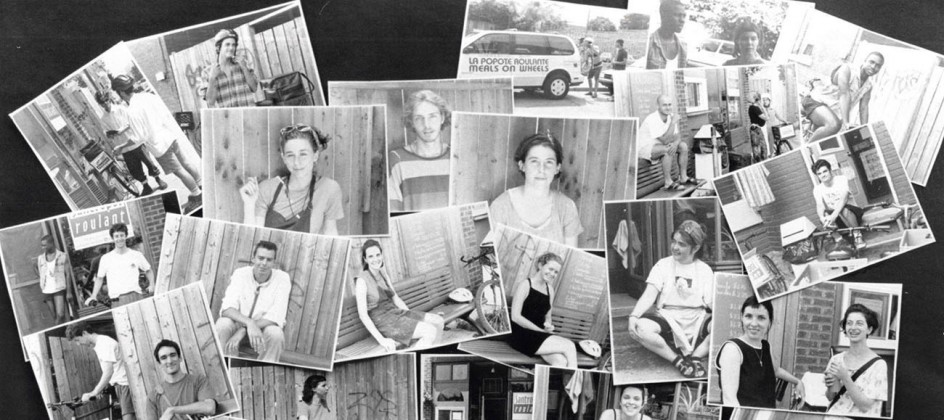In 1995, Santropol Roulant came to life as a budding meals-on-wheels organization connecting youth and seniors through food and intergenerational activities. Today, Santropol Roulant is still that, and so much more! Here is a glimpse into our history through key moments, projects and events over the past 21 years.
Santropol Roulant’s beginnings: the founders
Christopher Godsall & Keith Fitzpatrick, two waiters working at Café Santropol, were searching for meaningful work in Montreal. A volunteering experience opened their eyes to the impact that a friendly visit and a warm meal could bring, both for youth and seniors. By providing employment and engagement opportunities for youth, and meals and social inclusion opportunities for seniors, two marginalized groups in society could help each other out.
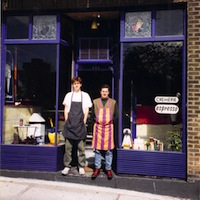

A first home at 111 Duluth
Chris and Keith apply for funds from Youth Service Canada (YSC) to get the project started. In January 1995, Chris and Keith move into 111 Duluth O with the support of the Volunteer Bureau of Montreal.
First meal served
June, 20 YSC participants arrive and Santropol Roulant serves the first meal of 11 sandwiches!


First temporary shut-down
Later in the year SR experiences it’s first temporary shut-down due to lack of funding. The Roulant experiences many similar challenges in the early years, but pull through thanks to many supporters and dedicated volunteers.
SantroVelo
SantroVelo gets its start in the Roulant basement in 1996. At first it is just a place to store delivery bikes or fix a flat until a volunteer, John Foster, takes it to the next level and transforms the space into a true bike shop called CFTMTSESSR: Centre Fais Le Toi-Même du Transport Sans Effet de Serre du Santropol Roulant.
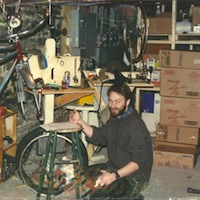
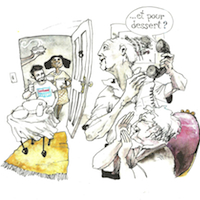
Youth engagement
The Students for Home Care Project is the first initiative that engaged young students with seniors through the Roulant. Young people and students continue to play a huge role in the organization for decades to come!
Intergenerational activities
Intergenerational activities begin in 1996 with picnics in the park, communal meals, outings to the botanical gardens, workshops and seminars are organized to bring youth and seniors together to share experiences and stories.
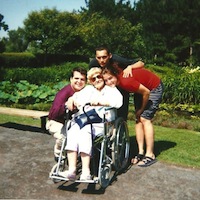
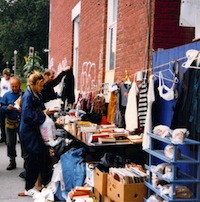
The Bazaar
In April 1997, a new fundraising event is organized by volunteers on Duluth street. The Bazaar becomes a neighbourhood favorite for several years and a place where many items are sold from used books and clothing to kids toys and furniture.
Soupe-Art
The day after the bazaar Soupe-Art is held to raise funds and awareness about global malnutrition problems. 10$, bought participants a handmade ceramic bowl filled with delicious soup.
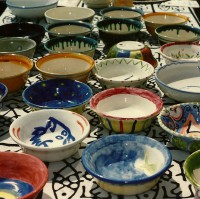
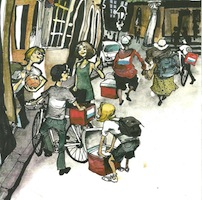
Skills exchange program
July 1997 marked the beginning of the Skills Exchange Program, a project where 8 young participants worked at Santropol Roulant in exchange for inexpensive housing and other benefits. This project, sponsored by the Samuel and Saidye Bronfman Foundation, was geared towards low-income youth between the ages of 17-28.
Le Pont Roulant
The newsletter Le Pont Roulant is created! Volunteers and staff put together this free publication.
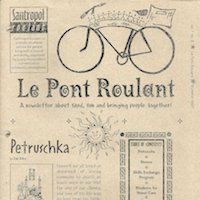

The Ice storm
The ice storm was Santropol Roulant’s first experience coping with an emergency situation on such a grand scale. From January 8th – 16th 1998, a stream of volunteers filed in to cook and deliver 250 meals per day, much more than the usual 100! Neighbours and friends gathered together during this difficult time, and when the power ran out in the kitchen, someone provided a camping stove to continue cooking stew outside.
Bittersweet deliveries
Bittersweet deliveries, an NFB film documentary about the Roulant, followed 5 youth over the course of 6 months to capture their thoughts and their touching interactions with seniors.
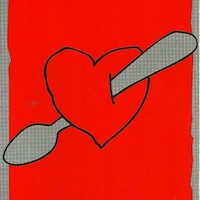
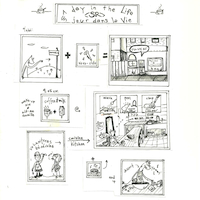
Projet Go
In 1998 A new youth engagement project begins called Project Go (Générations orientées). University and CEGEP students form their own meal-delivery clubs and meals are dropped off at their schools. They then delivered the food to clients living in nearby neighbourhoods. Each group kept a journal of notes and anecdotes about their experiences on deliveries.
Le Carrefour des générations
Carrefour des générations, a project supported by the Téléglobe Foundation, is the first intergenerational project of its kind. Situated at the corner of Duluth and Saint-Urbain, the centre brings people from different generations together around a variety of activities such as yoga and story-telling.
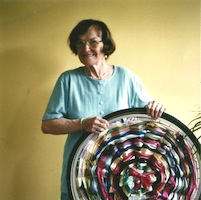
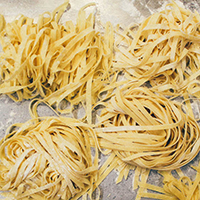
First Gala: Basta Pasta!
In 2001, the Roulant organizes our first ever fundraising Gala: The Basta Pasta Circus Cabaret. “The world premiere of Mad Chef Joe De Paul’s Basta Pasta Cabaret will be an entertaining evening of music, laughter, acrobatics, and homemade pasta all in the spirit of giving.” This sold out event raises $6000 for the meals-on-wheels program, and paves the way for cabaret-style fundraisers in the years to come, such as Gong Fondu and Mobster Lobster!
Composting at Cantaloup Garden
The first composting project begins in the Roulant kitchen in 2001. Kitchen scraps are is delivered to the Cantaloup Collective Garden in NDG. Waste is reduced by 40% and organic materials are transformed into rich fertilizer which can in turn contribute to urban agriculture.

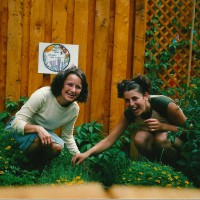
First gardening season at Café Blanc de Blanc!
The Roulant’s agriculture program sprouts from this first gardening season at Café Blanc de Blanc in 2002. The goal was to grow organic herbs and a few veggies to incorporate into meals. This was a first step towards using urban agriculture to increase food security in Montreal.
Words-on-Wheels
The Words-on-Wheels newsletter is first created in the early 2000’s to connect clients with local resources that compliment their meal service. The newsletter also served as a communication and inclusion tool, sharing elements of every day life at the office, information about projects and upcoming events, and news from staff members and volunteers.

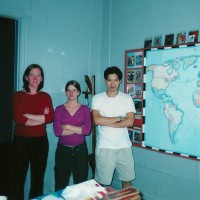
Map of the world
This memorable project was created to celebrate the cultural diversity found within the volunteer and client base. Using artistic expression and story-telling, participants created a giant map of the world that told a visual story of the communities’ origins and travels.
The Southern Wall
The Southern Wall by W. O. Nilsson, was first published and printed in 2003. The book explores the practices and interactions behind the everyday magic found at the Roulant. The book is distributed to over 800 individuals and organizations around Canada and abroad.
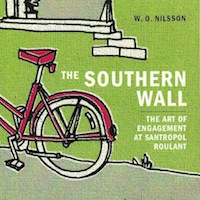

Living labs
This initiative was created in 2004 with the goal of sharing out the Roulant’s unique culture and practices with other organizations. Using our own experiences as a starting point, the Lab invited other organizations to observe their own culture, space, and activities and to experiment with new ways of involving the community in their work.
Harvesting Histories
The goal of the Harvesting Histories project was to document the rich experiences of the Santropol Roulant community – seniors, volunteers, staff, neighbours, supporters – around food and community through photos, video, audio, written stories, oral histories, art contributions and of course, recipes. Harvesting Histories magnified the intergenerational component of our mission by creating opportunities for community members to get together and collaboratively shape our events and programs.
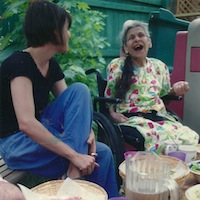

Rooftop Garden with Alternatives
In 2004, the Roulant and Alternatives team up to transform unused urban spaces into productive vegetable gardens. Think balconies, patios and rooftops.
This was a first step towards redefining local food security and developing a closed-loop food system at the Roulant: cultivating food, preparing and distributing it, and composting food scraps to make fertilizer for the gardens. Various workshops, special events, volunteer shifts are held and garden starter kits are distributed.
Creation of the Friperie
An extension of the Bazaar, the Friperie becomes a permanent installation where used objects and clothing can be purchased year-round and contribute to the auto-financing the Roulant’s activities.
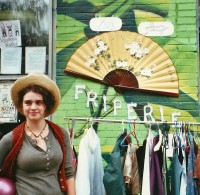
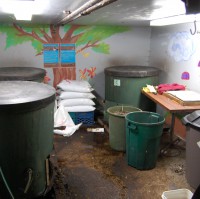
In-House Vermicomposting
In 2004, we begin vermicomposting in our basement. Kitchen scraps are added daily to three large Wig-Wams that house thousands of worms. Later, long tables and towers are added to increase in-house waste management, provide rich fertilizer for the gardens and to serve as a demonstration site for different methods of composting.
Introducing Organic
In order to offer healthier, and more sustainable meals to meal-on-wheels clients, the Roulant begins to incorporate organic ingredients into the meals. In 2005, the goal is to use 20% organic vegetables and reduce the amount of meat served by incorporating more vegetables into meals.


The 100 Mile Meal
This community event, inspired by the popular 100 mile diet, is created to draw attention to the concept of eating local. Each year a gourmet meal made from Quebec-sourced ingredients accompanied community conversations about local food.
Edible Campus at McGill
In collaboration with Alternatives and McGill, the Edible Campus, an urban oasis of vegetables and herbs, becomes a prime example of how urban spaces can be transformed into gardens while remaining functional public grounds. In the first year (2007), 200kg of vegetables were harvested and used by the kitchen.
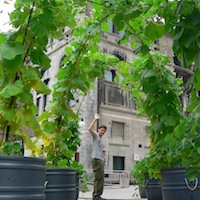

Economic Crisis
Due to the economic crisis in 2008 The Roulant suffered a drop in donations and government funding. The positive impact was that this eventually led to the Roulant creating new partnerships with funders.
Alternatives, Roulant, McGill collaboration goes international
In 2008 urban agriculture projects are created in countries like Cuba, Argentina, Mali, Ouganda and Sri Lanka, using the self watering containers for food production.
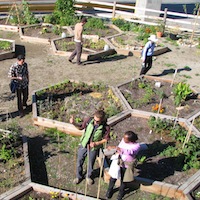
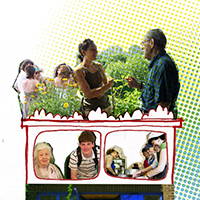
Securing our Future
The campaign Securing our Future, is launched to raise funds to buy and renovate a new space where we can grow. The dream is to BUILD a new home for Santropol Roulant that offers the stability we need to sustain and develop our program, GROW new opportunities for partnership, to deepen our work with our members and to increase our impact, and DELIVER an innovative model for community building that bridges service delivery and social inclusion within a sustainable urban food cycle.
Seasonal Market in Little Burgundy
In 2009 the Roulant begins selling produce at the little Burgundy Market – “Marché citoyenne”. The neighborhood is considered a food desert, and this market is a way for people to pick up low-cost vegetables and other food items locally. Santropol Roulant joins the market during the summer months, adding the option of local organic veggies to the mix, sold at a lower price point.
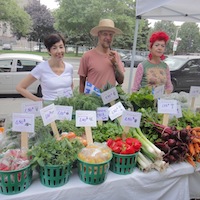
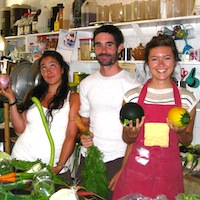
Beginning of Fresh Baskets
The same year, weekly vegetable baskets are introduced, making vegetables from the Edible Campus available to the public. The solidarity model of the baskets and market make it so that veggies are accessible to people with varying degrees of mobility, autonomy and socio-economic status. This model aligns with the belief that good quality food should be widely accessible.
Iron Chef
The Iron Chef cook-off competition is first introduced in 2010 as a community event and fundraiser that highlights locally grown food and cooking creativity. Several local restaurants participated and were given one hour to harvest vegetables and herbs from our community garden and cook up a meal on the spot for a panel of judges.
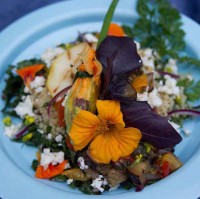

A new home at 111 Roy
2010 was a big turning point for the Roulant as we moved into our new home at 111 Roy East. The new space would make us building owners and offer about 5 times the space of the old space, lending well to expansion of projects and welcoming more people into our home. Over 150 volunteers helped out with the move!
A building with a history
The building has a long history, with past lives including a fish depot and artists’ workshop. The space was completely renovated to accommodate our needs, including installing a kitchen triple the size of our previous one, creating a space dedicated to vermicomposting in the basement, and reinforcing the building structure to be able to support a rooftop garden.
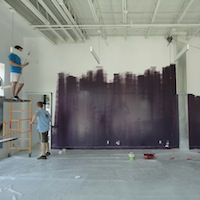
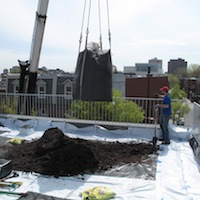
two rooftop gardens
15 tons of earth were lifted to the 1500 square foot rooftop of the building and formed into beds on top of a membrane. This garden is also home to our beehives. The second garden space at 111 Roy is on the terrace and consists of over 50 self-watering containers, a small greenhouse and outdoor kitchen for cleaning vegetables.
Beekeeping collective
Formed in 2011, the Beekeeping collective is a small group of beekeepers with varying levels of experience. The collective keeps hives on the Roulant rooftop as well as on the McGill campus, and meets regularly to care for hives and share knowledge about their common interest: bees!
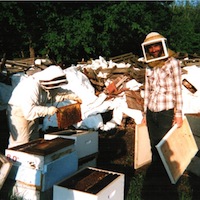
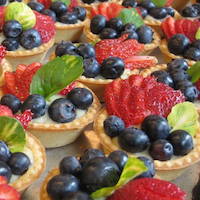
Social entrepreneurship strategies
In order to diversify funding, the Roulant begins to develop initiatives that can bring in funding to support other programs and activities. Using the space and resources at hand, and keeping in line with our mission, the catering service expands and second floor loft and terrace become available for rental. Frozen meals are introduced for members of the general public.
Les fruits défendus collective
Les Fruits Défendus, urban fruit harvesting collective, is started by a group of young Montrealers who decide to partner up with the Roulant. The volunteer collective connects fruit tree owners with volunteers to give forgotten urban fruits a delicious destiny and to provide fruit to food security organizations.
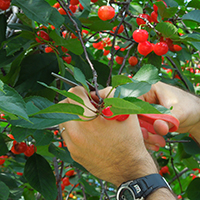
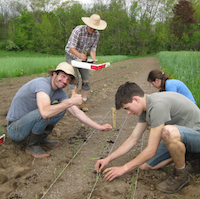
Roulant Farm in Senneville
In 2012, Santropol Roulant gains use of a farm site in Senneville. The close proximity to downtown Montreal, the potential for collaboration with other local growers and researchers, and the high fertility of the soil, allow us to substantially augment our work in food security and agriculture.
Intergenerational gardening
The intergenerational gardening project pairs volunteers with meals-on-wheels clients. Weekly volunteer visits to clients homes to take care of the garden are also a great way to connect over the course of a gardening season. We provide all of the materials necessary to start and maintain a small balcony garden and occasional gardening sessions are also held in our gardens.
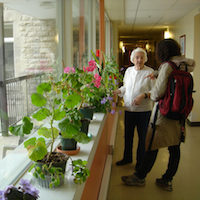
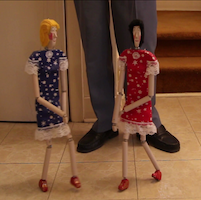
Amplifying Voices
Made in 2013, this video project was brought to life by clients and volunteers to share knowledge and amplify the voice of seniors. Six meals-on-wheels clients talk about their experiences on a range of subjects from friendship and communities, personal histories to and hobbies and more.
Food preservation
In the kitchen, we begin preserving surplus from our farm’s production, our two urban gardens and fruit that’s harvested by Les Fruits Défendus. Volunteers learn to pickle vegetables, concoct delicious sauces, spreads and jams, ferment foods and dehydrate herbs and vegetables.
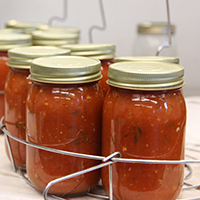
 “]
“]
General Store
In 2014, we set up a general store space in our office to make more of our products available to the public, including our preserved goods, t-shirts, honey and fresh veggies from the farm.
MyCollective and Vermicomposting
A group of volunteers forms the the mushroom growing collective “Mycollective” to explore mushroom growing techniques and produce mushrooms for the kitchen, and the Vermicomposting project also moves toward a “collective” model as volunteers take more leadership in the destiny of our worms and kitchen scraps.
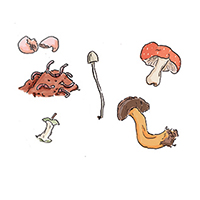
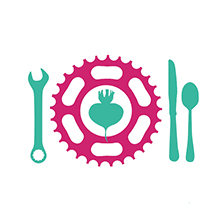
Mise au Point
Mise-au-point is the result of a three-year project in food safety and nutrition to improve our Meals-on-Wheels service and to ensure that our work has a growing impact on the well-being of elderly Montrealers.
As part of this project, we developed a website called Check-up. Here, health professionals (and everyone else) can freely access tools, processes and recommendations about offering food services to seniors that are well adapted to their needs.
1st Farm Hack
In May 2015, the Santropol Roulant Farm organized the first Farm Hack in Quebec. 11 farms and more than 30 individuals participated in this day of collaboration and construction. The goal was to design, source materials and build custom root vegetable washers in a fashion that would be cost efficient and strengthen partnerships between farmers. Each farm saved around $2000, when compared to buying the most affordable option from the States, and the of the parts were sourced locally.
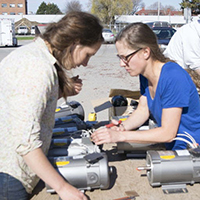
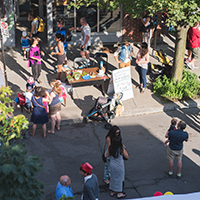
Rue Fermier
We celebrate our 20th year with a huge street party complete with workshops, an Iron Chef competition, a market, good food, live music and most importantly, an enormous range of community members from all walks of life and friends from all points in our history.
Learning from our elders
In December 2015 we launched our 20th-anniversary cookbook: Learning From Our Elders. This book is the result of a series of workshops held in 2015, where seniors from different cultural backgrounds shared cooking techniques, recipes and their love of food with community members.
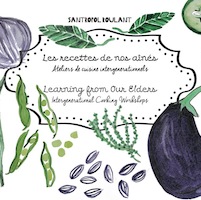
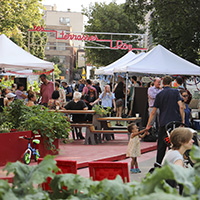
Terrasses Roy
The inauguaration of the Terrasses Roy took place on Thursday, 22nd of June 2017. This pedestrianization and urban planning project is an initiative of the Plateau-Mont-Royal borough, which is responsible for its planning and management. All summer long, we cultivate food and host activities in the space for the community. Access to the space and the harvest of the vegetables and herbs are completely open the public.
Elevator
In March 2018, the Roulant provides an accessible rooftop garden for everyone, regardless of their level of mobility, with the construction of a new elevator. The elevator is our largest infrastructure investment since the purchase of the building. This project was made possible with the generous contribution of Employment and Social Development Canada, Foundation Marceau et Jean Coutu, the R. Howard Howard Webster Foundation, the Molson Foundation, the Rick Hansen Foundation, the Silver Dollar Foundation and over 150 individual donors.
